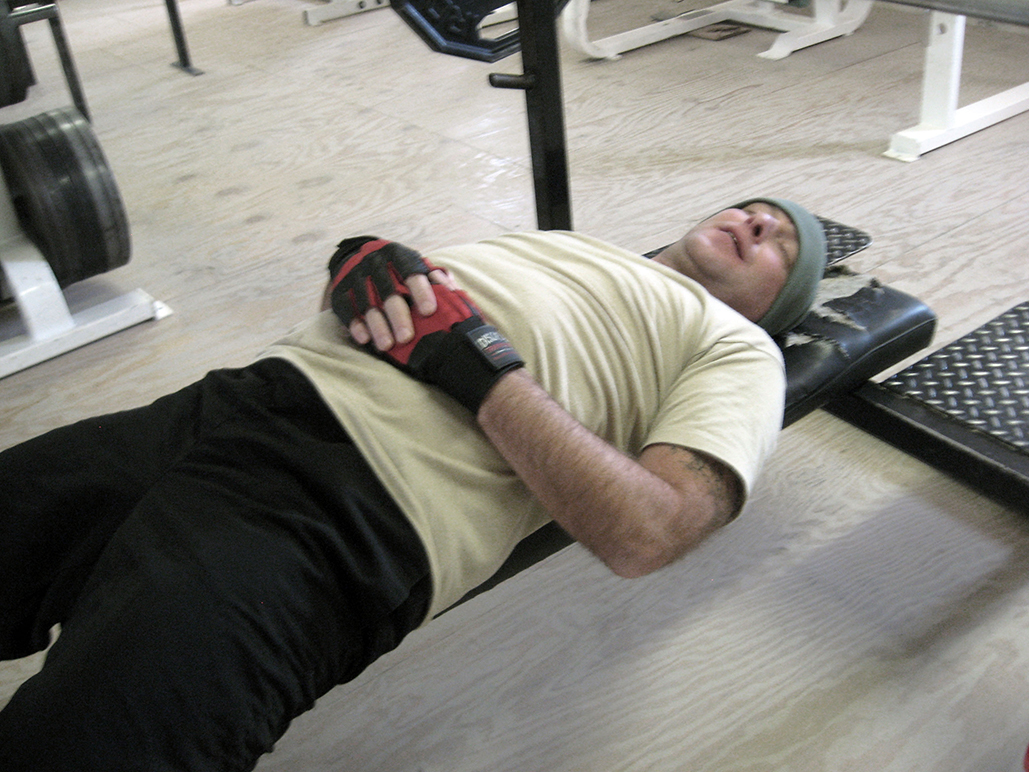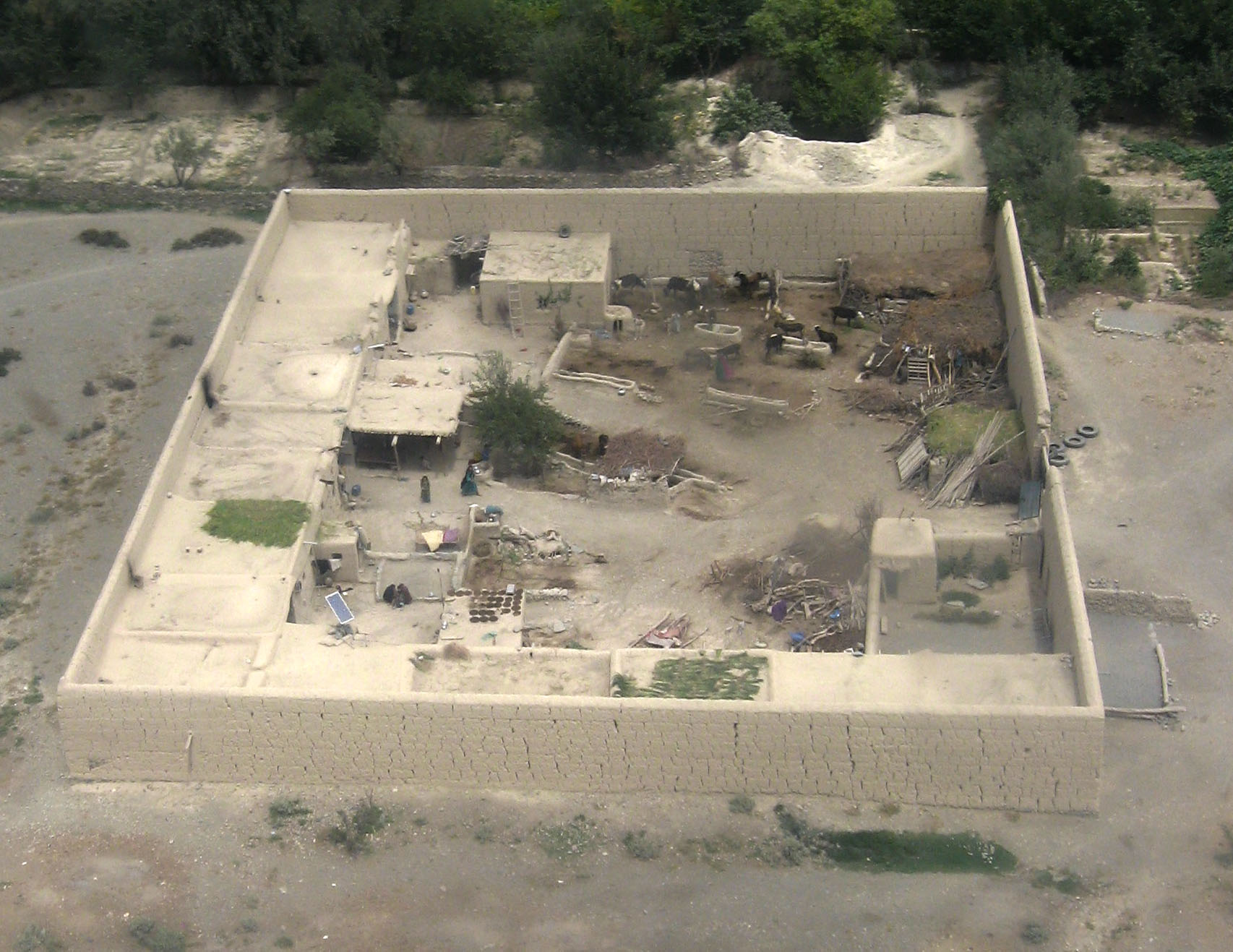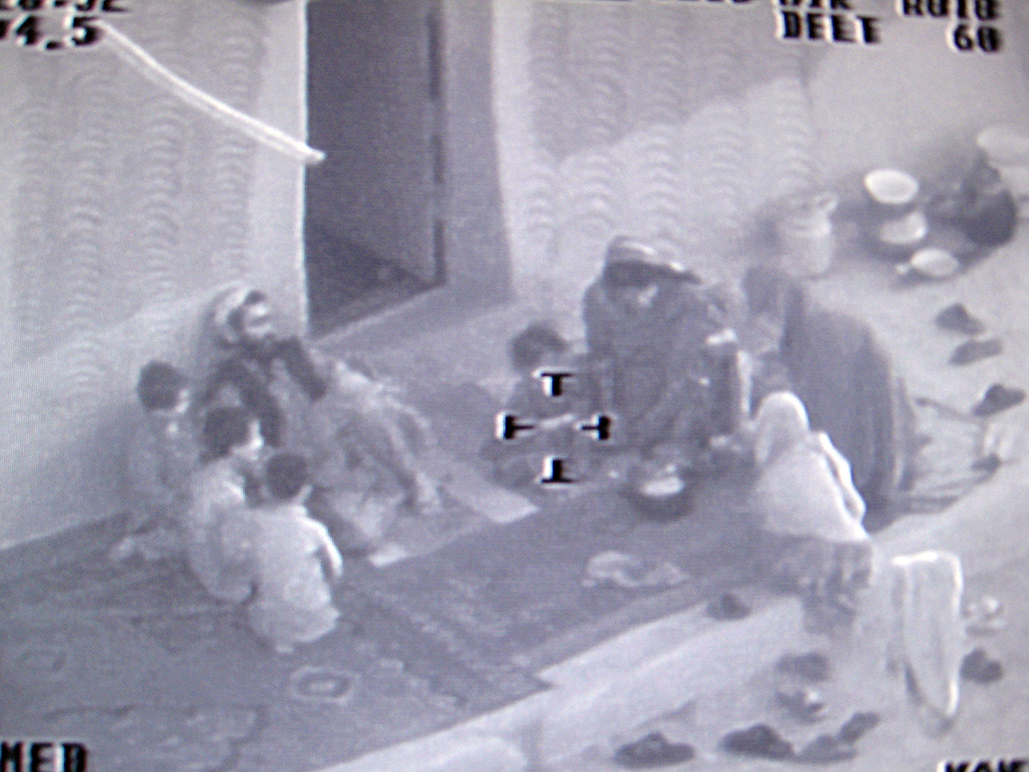Captain EllisChapter 86 of Balloon Wars: An ISR Operator's Account Of The Wars In Iraq & Afghanistan
© Robert A. Crimmins
Captain Ellis between sets at the gym in Waza Kwah© Robert A. Crimmins
I spent a lot of time studying this high resolution image of a qalat and its residents somewhere between Zormat and Salerno. The woman, a little left of center in the frame, is looking up at the helicopter. Her stride was strong and purposeful. Her story is what occupied my mind.Chapter 86 – Captain Ellis
FOBbits. The gym at FOB Waza Khwa. Working out with Ed. Ellis’ meeting with the pharmacists. He is ordered not to help the Afghans.
Some of the soldiers on the FOBs go out on patrols or for other purposes. Like me and most other contractors some soldiers rarely leave. Danny called those of us who remain inside the wire, “FOBbits”. So for us the FOB is like a prison or a ship in that there aren’t many places to be. Most of the time you’re at work and in the few spaces that location includes. Off duty hours are spent in your quarters, if you have quarters that provide privacy, at the chow hall, in whatever MWR facilities there are or in the gym.
Balloon Wars Home Page
OTHER SELECTED CHAPTERS
Chapters 1 & 2 – PTDS & the ISR Network
Chapter 12 – Battle in Al Atiba’a
Chapter 17 – Muqtada al-Sadr
Chapter 33 – Urged to Jump
Chapter 40 – Mortar Attack
Chapter 78 – UTAMS Repair
Chapter 79 – IRAM – A Deadly New Weapon
Chapter 82 – Bagram and Waza Khwa
Chapter 87 – 9th Inflation and The Karez
Chapter 116 – Just Living
Most of the FOBs had adequate exercise facilities especially for weight lifters, which is the kind of workout I prefer when I can’t swim. The other thing that the gyms at the smaller FOBs can provide is a place to socialize. At the large FOBs and bases like Camp Slayer and Bagram Air Force Base the gyms were more like the franchise fitness clubs back home where people don’t pay much attention to each other but at the COPs and smaller FOBs you see the men that you cross paths with during the day so when you see them in the gym there’s more recognition.
The gym at Waza Khwa was pretty good. There was one Universal© machine and plenty of free weights which was all I needed. I maintained a pretty rigorous workout regimen the whole time I was in Iraq and Afghanistan so I stayed in good shape. It took a few weeks to adjust to the thin air at Waza Khwa but once I did it felt great. The soldiers, all young men, knew what I was going through and once they saw how I worked through it, some of them started to talk to me.
Ed, a sergeant of Latin-American descent, used to tease me about “lookin’ pretty good” or “hittin’ it pretty hard for an old guy” and I would call him a punk or gangbanger. I learned from the others that he was an excellent soldier. One day after a good natured ribbing from him I rushed him and we locked up and pushed each other around for a few seconds and I could feel he was hard as a rock. I was a collegiate wrestler which means I have those martial art skills and a tendency for physical play that wrestlers tend to have. When I give in to the urge I can readily sense if the man or women I’ve engaged is strong or agile and if they want to play. Ed had told me that he was into some kind of core training program developed by a Russian martial artist and like me, he hit it hard every day. He let me push him a few inches but as I continued to press him he became utterly immovable. Trying to get him off his stance was like trying to displace a tree. He had shown me some of the exercises in his program and they were very difficult so I knew how he was able to develop as he had. For guys like us, living the lifestyle we lived, working out daily was an obsession.
Captain Ellis, who was the medical officer, was another one I’d talk to occasionally at the gym and elsewhere but he was more serious. He had a good attitude and did his job real well but he was older than the others and had seen the worst so he was more serious.
One day he and I happened to be at the sinks in the shower house at the same time. I was shaving my face and he was shaving his head. A Specialist came in and told him the people he was supposed to meet at 1400 were at the ECP. He looked at his watch and said, “Let ‘em wait. They can ‘insha’Allah’.” He offered the mandatory Islamic response for anything that one plans to do, which means “if God wills” as if to say, “They can kiss my ass.” While he continued to pull the razor over his scalp I asked him what was his meeting about. He explained how pharmacists poison their customers in Afghanistan. They sell medication to the parents of sick children by the color of the pill. Red pills cost more than another color, say blue which are more than another, maybe yellow. No matter the illness or symptoms the patient gets what he pays for, by color.
Ellis said, “I had a three year old brought to me, and a four year old, another kid was 11. A thirteen year old was brought in three times. Every time I had to give him CPR. The last time he died. He was on twenty different meds. His parents kept buying more expensive colors, ‘till he died.
“I can’t stand this shit any more. I hate the fucking army. When I joined in 1981 the Vietnam guys were still in and if a private screwed up you could slap the guy, or worse. You can’t touch these guys now.
“These guys that are waiting outside, the pharmacists, I asked them to come in here to talk about how they’re killing people and they blew me off. So I had ‘em arrested. They’re sittin’ out there now in zip cuffs. I’ll teach them to fuck with me.
“There’s a doctor in one of the villages too. He’s not very good but he is trying. These pharmacists are another thing. Nothing matters but the money. All these people are like that. In Iraq the people are loyal to their families and their tribe and to some degree their sect. Not here. Not these people.”
He was letting off steam and it was not like him. It had probably been a long time since he’d expressed himself like that and maybe he could do it with me, a contractor, and he couldn’t with other soldiers.
“I have four kids and I haven’t seen any of them do the big stuff. Not once did I see a first step or a graduation. I’m always away. I thought after all the deployments, including two in Iraq, I’d get a break. They sent me here, calling me back as a medical officer even though I was an intel officer at the time, in the Guard. And I don’t even know how long they’re gonna keep me here. But I’m getting’ out for good as soon as I can.”
Ellis was on his sixth deployment there in Waza Khwa.
He’s not supposed to do anything for the people outside. He got orders not to give any help to the locals. He said, “How am I supposed to do that? A man shows up at the ECP with a dying eleven-year-old and I’m supposed to let him die? Shit. How does that work?”
He wasn’t concerned about disobeying the order from the colonel in Bagram. As distant and insignificant as our medical officer was, no one outside our district would ever know who Captain Ellis saved or didn’t. I finished before he did. Walking back to my quarters I thought about what he’d said and realized that I considered it a privilege to have known him.
This program is about my job in the war zones and how the events of September 11, 2001 affected my family. It isn’t the television version of the memoir. The resources to produce that are beyond me, but the video and stills in this more modest production compliment the book.
Click here to comment on any of the Balloon Wars sample chapters
Book Chapter and photos © Robert A. Crimmins, Felton, Delaware, USA
OPERATION ENDURING FREEDOM BACKGROUND
Charles Lindholm is a professor of anthropology at Boston University and his book, The Islamic Middle East: An Historical Anthropology is an anthropologist's perspective on the history of the Middle East that places Islam in context with the other conditions that have shaped the cultures of the tribes and ethnicities of the region.
Pashtunwali or the “way of the Pashtun,” is an unwritten set of traditional, pre-Islamic rules that dictate many of the social interactions and norms amongst the Pashtun.
Tribal ways define Afghans' political realities by Charles Lindholm appeared in the Wilmington, Delaware News Journal on December 26, 2001
The Human Terrain Program puts anthropologists and social scientists on the ground in Afghanistan to gather intelligence for the U.S. military. It's a good idea in many ways but it is extremely controversial among academics and has resulted in hardship, and worse, for some of the program's employees.
Learning a Hard History Lesson in 'Talibanistan' is a May 14, 2009 Wall Street Journal article about the inadvertent destruction of a vital and ancient irrigation system. Chapter 87 of "Balloon Wars" is about the Karez, the amazing means by which Afghans have controlled their environment for a thousand years.
CONTACT ROB CRIMMINS



